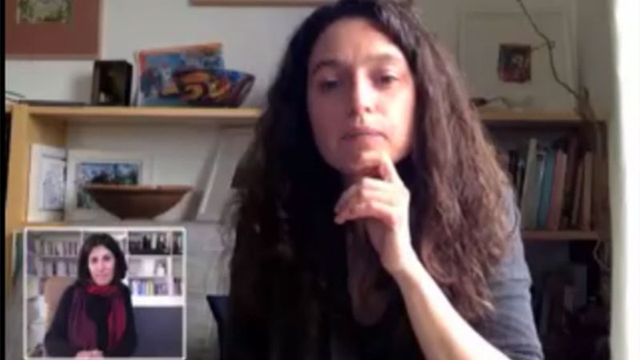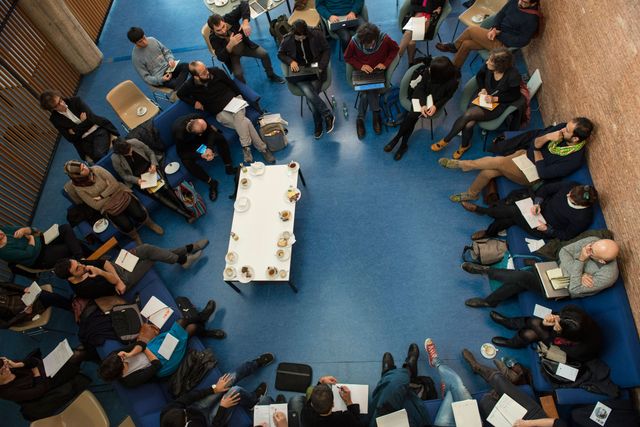Al-mashaa’ or the Space of the Common
In Western political thought, the notion of public space is often associated with the “collective interest,” and the “common good.” However, in other cultural contexts, such as in the Arab countries, the notion of public space is seen as suspicious. During the years of direct colonial domination, the public space never denoted the “collective interest” of the local population; rather, it expressed the arrogant, violent, and exploitative power of the white European élite. In the name of the public good, state colonial authorities frequently expropriated that which people shared in common. For instance, the expropriation of land by the colonial authorities in the name of the “public interest” illustrates how public interest does not necessarily coincide with the common good. The difference between a static and rhetorical notion of the public and the inventive and interactive notion of the common has been polarized by the obsession of the state apparatus with security and control. The overregulation of public space expresses the authorities’ fear when it sees a plaza or a roundabout or a boulevard transformed into a political space capable of undermining the state’s authority.
Unfortunately, following independence from colonialism, most of the Arab regimes continue to suffocate the very existence of the common space. Public spaces—instead of expressing peoples’ freedom, sovereignty, and dignity—are turned into the repressive and conservative face of the regime. The neoliberal waves that have invaded the Arab world during the last two decades have dismantled any possibility of public space linked to common, unplanned uses.
However, since 2010, the Arab revolts have opened up new political directions and possible re-articulations of the public, the common, and the private. These events could be fundamentally interpreted as the will to re-imagine and re-claim the existence of the common space. The demonstrations in Habib Bourguiba Avenue in Tunis, the occupations of the roundabout in Tahrir Square in Cairo, and Pearl roundabout in Manama, Bahrain, are only glimpses into a much more profound struggle for common political space in the Arab world.
Revolts
During the weeks following the Egyptian revolt that began on January 25, 2011, we observed as a public plaza was transformed into common space owned by the people themselves. Tahrir Square became the political space where new claims were invented, represented, and translated into political action. The day after President Hosni Mubarak was forced to step down protesters began cleaning the space, an act that highlighted the end of a regime and the beginning of a possible new era for the Egyptian people. The space was no longer perceived as public—the space of authority—but rather, the space of the people. Owning the space implied owning the future of the country. Cleaning the square was a gesture of re-appropriation, ownership, and care. In fact, this apparently banal act demonstrated a sense of reconstituted community and collective ownership.
The power of gatherings, and the transformation of public space to constituent common space, has manifested itself in other places throughout the Arab world. In February 2011, people began assembling around the Pearl roundabout in Manama, Bahrain, converting the anonymous infrastructure into a political arena. As in Tahrir Square in Cairo, this roundabout became a constituent assembly capable of undermining the political regime.
Consequently, on March 18, the local authorities brutally intervened, completely destroying the roundabout. This act demonstrated the importance of a physical space where people can assemble and assert their rights; without it, the virtual space of social networking is ineffective.
The ambiguous nature of contemporary public space is also observed in Western society. During the summer of 2011, a group of protesters tried in vain to assemble and camp out in several public spaces in New York. Paradoxically, their attempts were limited by the regulations and curfews imposed on these spaces. Only on September 17 were the protesters able to set up camp in Zuccotti Park, a privately-owned public space. This crack between the public and the private perhaps represents all that remains of a shared collective space, what we call a common space, that is, neither public nor private.
Al-Mashaa' and the Space of the Common
The idea now is to expand on the reflection of public space beyond these events and explore the ways in which public and common spaces are shaped and constituted.
We would like to propose a critical understanding of the contemporary notion of the public by re-imagining the notion of the common. Rather than the term “commons,” more familiar in the Anglo-Saxon tradition, we prefer to use “common” in order to refer to its Latin origin communis. The Latin communis is composed of com (= cum) “together” and mòinis, the original meaning of which was “obliged to participate.” This fundamental aspect of the common—a demand for active participation—is also present in the Arabic term al-mashaa’', which refers to communal land that is equally distributed among farmers. This form of “common land-use” was not fully recognized under Ottoman law—and for this reason, al-mashaa’ was not acknowledged under any written title in the Ottoman Code—and was dismissed by colonial authorities for its supposed economical inefficiency. Colonial regimes, interested in territorial control, see in al-mashaa’ land a collective dimension beyond state control. Consequently, al-mashaa’ have been transformed into state-owned lands, and therefore fall under the control of public land managed by the state apparatus. Al-Mashaa’ is shared land, which was recognized through practice in the Islamic world. It emerged as a combination of conceptions of Islamic property and customary practices of communal or tribal land. Al-Mashaa’ could only exist if people decided to cultivate the land together; and the moment they stopped cultivating it, they lost possession. Thus as the term denotes possession through common use, what appears to be fundamental is that in order for this category to exist it must be activated by common uses. Today we may ask if it is possible to reactivate the notion of common cultivation, expanding the meaning of cultivation to other human activities that imply the common taking care of life (cultivation from Latin colere = taking care of life).
The refugee camp as a site of political invention
Refugee camps are sites where the categories of public and private can no longer subsist. Within camps, neither public nor private property exists. After sixty-four years, Palestinian refugees still cannot legally own their own houses (though in practice they do) and the camp is a space carved from the territorial state. Though states and non-governmental organizations are actively participating in conceiving and managing camps, we are still struggling to fully comprehend how the camp-form has contaminated and radically transformed the very idea of the city as an organized and functional political community. Thus, the birth of the camp calls into question the very idea of the city as a democratic space. If the political representation of a citizen is to be found in public space, in the camp, we find its inverse: here, a citizen is stripped of his or her political rights. In this sense, the camp represents a sort of anti-city, but also a potential counter-site in which a new form of urbanism is emerging beyond the idea of the nation-state.
Consequently, considering the return of Palestinian refugees, therefore, will not only demand a change in the political systems of Israel and Palestine, but also imply transformation of the entire region. There are almost half a million refugees in Lebanon and Syria, and two million in Jordan. Exploring their return means also looking at ways in which the figure of the refugee, and the associated spatial regime of dislocation, reshapes the larger geopolitical space of the present.
The workshop
The workshop “Al-Mashaa’ or the Space of the Common” took place between October 30 and November 1, 2013, at Haus der Kulturen der Welt (HKW) in Berlin, Germany. Centred on practices and conceptualizations of common space in the Arab countries and beyond, thinkers, activists, and researchers from Mediterranean and European countries debated and critically reflected on ways in which public and common space are constituted, occupied, maintained, and shaped. The workshop took place in both public and private spaces—in the private space of an artist’s studio in Berlin and in the institutional space of HKW—and at the public closing session, some one hundred and fifty people gathered to discuss troubling issues of our times and to consider constructive ideas to address them.
Altogether, twenty-five participants, living in and originating from places such as Egypt, Germany, India, Italy, Iraq, Jordan, Lebanon, Palestine, Tunisia, Turkey, the United Kingdom, and the United States, presented short theses stating their fields of interest and research within the overall topical framework of common space and the recent revolts in Arab countries and elsewhere in the world. Presentations and discussions were organized around key terms such as imagination and dreams, collective memory and the future, eviction and appropriation, revolt and institution, with the debates taking up various approaches, definitions and possibilities, and exploring problems of common space and notions of the common. In the framework of the symposium “A Journey of Ideas Across: In Dialog with Edward Said” and its spirit of a critical, politically engaged and transdisciplinary form of enquiry, the participants of the workshop altogether initiated a collective reflection and discussion about the forms in which common spaces today are produced, contested and expropriated, over all in eastern Mediterranean countries.
The online platform “Al-Mashaa’ or the Space of the Common”: Continuing the conversation
Several important questions have emerged during the workshop: How to stabilize forms of commoning that would allow the creation of new institutions? How is al-mashaa’ challenging the very use of fundamental notions such as legality and illegality, public and private, appropriation and expropriation? How is it possible to conceive common spaces for commons uses without creating exclusive or self-secluded communities?
As many participants, like us, were eager to continue the conversation and discuss these questions, we set out to do so through a series of Skype-conversations to take up the most pressing topics that have been addressed during the workshop. Still not wishing to end the discussion here, however, we sought to provide a platform for further conversations between existing workshop participants and also to expand the dialogue beyond this initial group. This discussion will take place within, and be published by, the online-platform “Al-Mashaa’ or the Space of the Common,” hosted in collaboration with HKW. The online platform presents extracts from longer online-conversations between participants of the workshop and us [curators Sandi Hilal and Alessandro Petti]. These fragments are all part of one ongoing, comprehensive discussion that (inter)relate with each other. Visitors are able to select those aspects that most interest them and explore the diverse notions of the critical debate around “Al-Mashaa’ and the Space of the Commons”; from there they can then, bit by bit, delve further. Subsequent conversations will be added in the future, so that the discursive virtual space is constantly expanding as the conversation continues.
The aim of this online-platform it is not to define once for all the term al-mashaa’, but instead to explore its conceptual and practical use beyond the “moments of revolt” into directly what we have called “the day after,” and to understand the challenges, the opportunities, and the traps of any social, spatial and political transformation.
Sandi Hilal and Alessandro Petti

